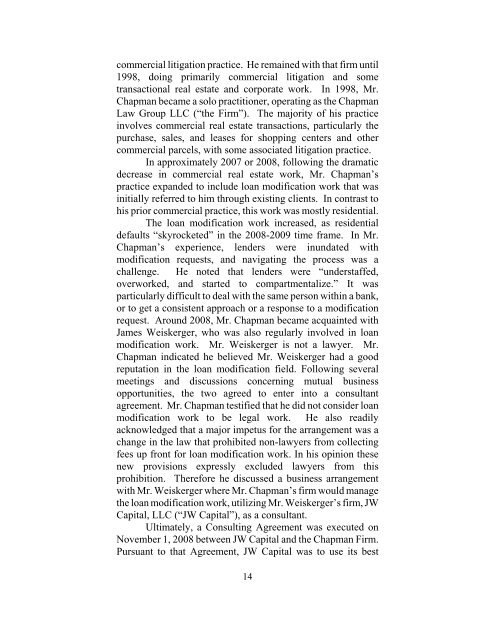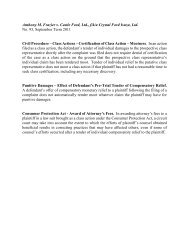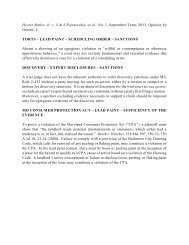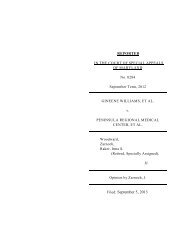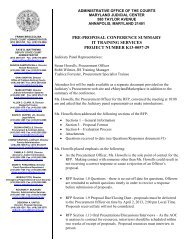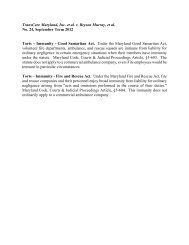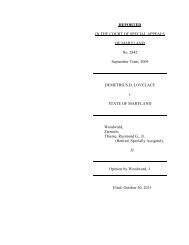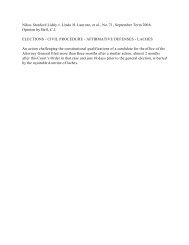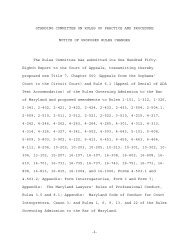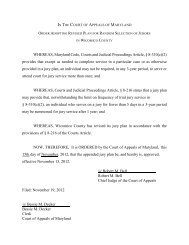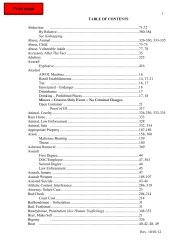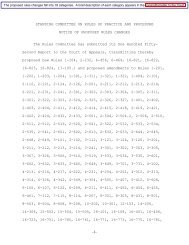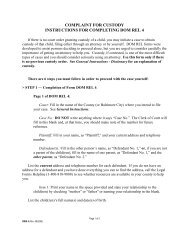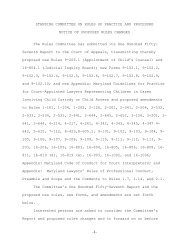44ag/11 - Maryland Courts
44ag/11 - Maryland Courts
44ag/11 - Maryland Courts
Create successful ePaper yourself
Turn your PDF publications into a flip-book with our unique Google optimized e-Paper software.
commercial litigation practice. He remained with that firm until<br />
1998, doing primarily commercial litigation and some<br />
transactional real estate and corporate work. In 1998, Mr.<br />
Chapman became a solo practitioner, operating as the Chapman<br />
Law Group LLC (“the Firm”). The majority of his practice<br />
involves commercial real estate transactions, particularly the<br />
purchase, sales, and leases for shopping centers and other<br />
commercial parcels, with some associated litigation practice.<br />
In approximately 2007 or 2008, following the dramatic<br />
decrease in commercial real estate work, Mr. Chapman’s<br />
practice expanded to include loan modification work that was<br />
initially referred to him through existing clients. In contrast to<br />
his prior commercial practice, this work was mostly residential.<br />
The loan modification work increased, as residential<br />
defaults “skyrocketed” in the 2008-2009 time frame. In Mr.<br />
Chapman’s experience, lenders were inundated with<br />
modification requests, and navigating the process was a<br />
challenge. He noted that lenders were “understaffed,<br />
overworked, and started to compartmentalize.” It was<br />
particularly difficult to deal with the same person within a bank,<br />
or to get a consistent approach or a response to a modification<br />
request. Around 2008, Mr. Chapman became acquainted with<br />
James Weiskerger, who was also regularly involved in loan<br />
modification work. Mr. Weiskerger is not a lawyer. Mr.<br />
Chapman indicated he believed Mr. Weiskerger had a good<br />
reputation in the loan modification field. Following several<br />
meetings and discussions concerning mutual business<br />
opportunities, the two agreed to enter into a consultant<br />
agreement. Mr. Chapman testified that he did not consider loan<br />
modification work to be legal work. He also readily<br />
acknowledged that a major impetus for the arrangement was a<br />
change in the law that prohibited non-lawyers from collecting<br />
fees up front for loan modification work. In his opinion these<br />
new provisions expressly excluded lawyers from this<br />
prohibition. Therefore he discussed a business arrangement<br />
with Mr. Weiskerger where Mr. Chapman’s firm would manage<br />
the loan modification work, utilizing Mr. Weiskerger’s firm, JW<br />
Capital, LLC (“JW Capital”), as a consultant.<br />
Ultimately, a Consulting Agreement was executed on<br />
November 1, 2008 between JW Capital and the Chapman Firm.<br />
Pursuant to that Agreement, JW Capital was to use its best<br />
14


